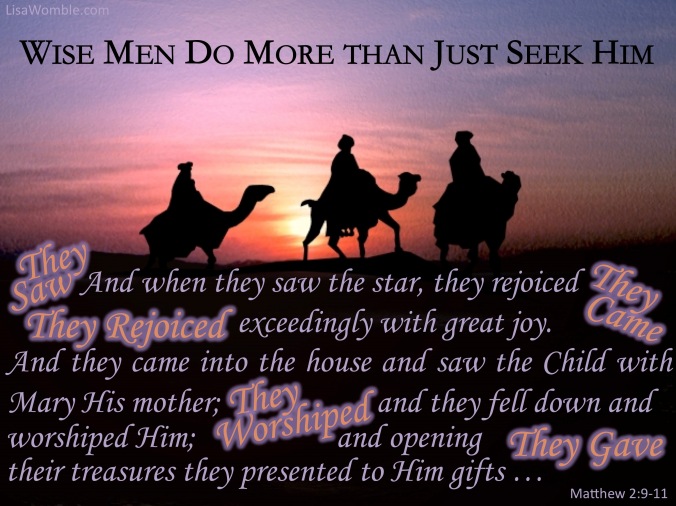
Background image V. Gilbert and Arlisle F. Beers
Do you really have a revelation of who Jesus is, of the significance of the Christmas event? I emphasize the word “really” because it seems many claim to understand the message of the Gospel, and may even have taken first steps in response to it, but do not live in a way that shows true, convicting, life-changing comprehension. Those who do truly see the significance of the King of heaven coming to live among us, and eventually die for us, are driven to respond to that revelation.
Like the wise men (or magi) in the Christmas story, the response of a true believer will include more than just an initial understanding. The story of the magi is short, but as the picture accompanying this devotion highlights, the few short verses devoted to them are packed with emotion and action.
We’re going to take a look at all those action verbs in that short verse, but before we do, I invite you to stop and say a quick prayer with me: Lord, help me to see You today, to really experience Your presence, to really grasp the meaning of Your birth, to really see – as they saw.
From the story of the wise men, we first see that joy accompanies the revelation of Christ – they rejoiced. Many at this time of year toss around the word joy, but real evidence of the joy in a Christian’s life should be seen all year. The believer’s joy is “exceedingly great.” It is the type of joy which overflows into action. The wise men were so stirred by joy they were willing to take a long trip to see Jesus – they came.
We can not visit the Christ-child as the magi did, but many opportunities are given us to experience Christ’s presence. Worship services, communion, fellowship with His people, His word, prayer, and even acts of service (Mt 25:35-40) are all ways to connect with Christ. Those who really believe the Gospel will avail themselves of these opportunities as much as possible.
The magi took advantage of the opportunity to see Jesus. When you read the full text of Matthew 2 and consider what we know of transportation in those days, you’ll see this was not a convenient trip for them. They had to search to find the child. Indeed, they sacrificed of their time, their energy, and their material resources to get there.
The next action of the wise men is significant. It shows they really did comprehend the importance of Christ and His mission. After they made the effort to come into His presence, they were humbled by the experience to the extent that they fell down before Him – they worshiped.
I started off by asking if you really get the message of the Gospel. The posture of the magi at this point in the story shows what it is like to fully understand the work of Christ. It is such a deep experience that it causes you to humble yourself, to fall on your face before Him and offer yourself to Him in worship. It is only when you get to this point with Christ that the next action has real meaning – they gave.
Many people give gifts, and for many reasons. We see this especially at Christmas. Some give out of obligation, some out of love, some out of guilt, some to show appreciation, some to impress others. Some motives are good, some not so good. Some gifts are good, some not so good. But even the best of gifts, given from the best of motives, will never compare with any gift – great or small, store-bought or handmade, an act of service or a word of encouragement – given in response to Christ. This is because any gift given in response to Christ actually helps to accomplish the mission of Christ.
Right after the magi leave, Mary and Joseph had to flee into Egypt to get away from King Herod. We know from the type of offering which was required of Mary and Joseph (Lk 2:24), and from their travel arrangements when they came to Bethlehem, they were not wealthy. This sudden relocation meant loss of income, as well as travel and resettling expenses. The gifts of the magi were surely a blessing which helped get them through that rough time.
The magi’s example of giving has inspired many to also give to Christ’s kingdom. As October’s devotion highlighted, giving to the kingdom will always have some kind of multiplying effect. In our first devotion in January, I used the text “He who refreshes others will himself be refreshed” (Prov 11:25b). The beginning of that Proverb is quoted in 2 Corinthians 9:6,7 when it speaks of sowing and reaping. Verse 24 of that same Proverb says when we scatter what we have, it increases. Remember, this has both material and spiritual connotations. We are promised material blessings when we give, but more important are the spiritual rewards. The Proverb (v. 30) reminds us that the real fruit of the righteous is the winning of souls. We must remember that all of our giving in response to Christ has eternal significance because it contributes to His purpose of reconciling sinners to God.
Let us be people who really understand the significance of Jesus birth, His death, and His resurrection. May we really rejoice in His message, with exceeding great joy! May we really see how important it is to be in His presence, taking advantage of the means He’s provided to do so. May we really worship and adore Him, all year long. And let us really open up our treasures and offer them to Him, and to others in His name.
Let us be people who really understand the significance of His birth … AND respond accordingly.


